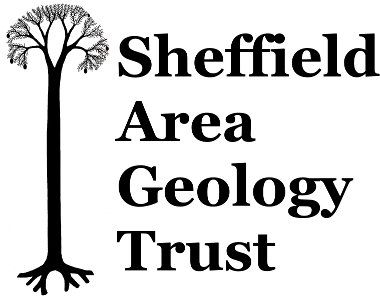Education & Geology
Recording, conserving and promoting the landscape and rocks of the Sheffield region
Education and Geology
Geology features in the formal education system in England and Wales in schools, at Primary and Secondary level, and in the Tertiary sector at university level. In both cases Earth Science is commonly used as a synonym, but Physical Geography also features significant geological content.
Geology in schools
The National Curriculum is now in its 7th iteration and SAGT joined in the Department for Education (DfE) consultation of 2013 which preceded it. The consultation resulted in considerable improvements to the original draft, and there is now a coherent framework of Earth Science for pupils to study, with effect from September 2014.
Primary Schools
Geology features in the National Curriculum, under the title of Earth Science, at Key Stage 1 (5 to 7 year-olds) and at Key Stage 2 (8 to 11 year-olds). Most of the substance is found within the Science curriculum, with some complementary topics in Geography. All schools within the maintained (state) sector are required to deliver the National Curriculum. Although the growing numbers of Academies and Free Schools are exempt, many use the National Curriculum as a framework for what they should study.

Primary: How to use a hand lens
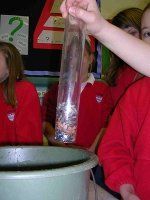
Primary: Jigging for galena
Secondary Schools
Aspects of geology are taught at Key Stage 3 (11 to 14 year olds) and at Key Stage 4 (14 to 16 year olds, leading to the General Certificate of Secondary Education, GCSE).
These feature in the statutory requirements for both Science and Geography at Key Stage 3. In particular pupils should be taught to understand geological timescales and plate tectonics, rock types and the rock cycle plus glaciation and climate changes since the Ice Age.
Geography is a popular option at GCSE and the curriculum requires detailed study of at least two distinctive physical landscapes in the UK and how they are formed by geomorphic processes at different scales, operating in combination with geology, climate and human activity.
All pupils are required to study Science up to GCSE. GCSE Geology is an option available in those schools which have the staffing and resources to deliver the course. It is taught to the normal GCSE age group (14-16), but has also proved popular at Post 16 level, as an extra subject. Currently, the only Awarding Body to offer GCSE in England is EDUQAS.
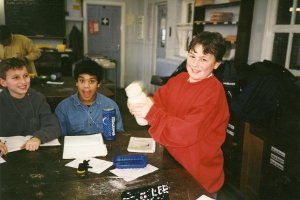
KS3: Modelling erosion
Post 16 Education
GCE Advanced Level Geology is an option for 16 year olds entering the 6th Form or equivalent at college. Whilst always a minority subject, studying it at this age can often enthuse students to follow a course to degree level, and, at the very least, it does provide them with an interesting qualification in a science, with useful transferable skills. Information on the value of A level Geology can be found on a leaflet down load from the Geological Society.
The two Awarding Bodies currently offering A level Geology in England are EDUQAS and OCR (Oxford, Cambridge and RSA).
Geography is a popular subject choice at GCE Advanced Level and all specifications are required to include aspects of geology through the study of how landforms make up characteristic landscapes and how these evolve as a result of physical processes driven by past, present and future climate changes. In addition, all specifications offer optional study units where teaching about plate tectonics, earthquakes, volcanic eruptions and other geological hazards, such as tsunamis, are studied in the context of natural hazards.

A level mapping at Castleton

A level mapwork
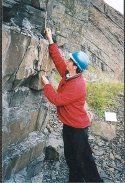
A level fieldwork

A level site visit

A level engineering geology
Schools and colleges in the local region currently offering a course in A Level Geology are as follows:
- Wales High School
- Thomas Rotherham 6th Form College
- Sheffield High School (for girls, but the school is happy to welcome any boys from other schools who would like to study geology A Level alongside their A levels in their own school, provided that their timetable allows it and their school is willing to fund it.)
Tertiary sector
There is now no university in the local region offering first degree courses in Geology. The University of Sheffield offers BSc and MSc in Physical Geography and Environmental Sciences and Postgraduate Certificate, Diploma and Masters courses in Environmental Engineering.
Sheffield Hallam University offers a BSc course in Environmental Conversation and a number of courses in Geography.
The nearest institutions offering a range of Earth Science courses are the Universities of Leeds, Derby, Manchester and Hull. Details of these and other university Earth Science departments may be obtained from the the Geological Society webpage on accredited degrees
Support for teachers and lecturers
SAGT
SAGT is willing to provide advice on suitable sites in South Yorkshire for teachers to visit with their students.
Earth Science Teachers' Association, ESTA
ESTA publishes Teaching Earth Sciences twice yearly to keep its members up to date and to disseminate good educational practice and ideas. The website has a members' only section with a wealth of geological material suitable for school use. An Annual Course/Conference is hosted by a variety of venues.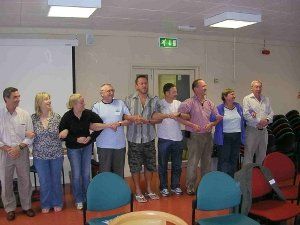
Esta Conference - making an S wave
Geographical Association (Physical Geography)
The Geographical Association has its HQ in Sheffield and has a Physical Geography Special Interest Group that supports teaching about landforms and how they are formed. It has a website (see below) with free resources on landscapes and other aspects of physical geography (including geology). More resources are available to members. Publications include: ‘Classic Landform Guides’ – a series of ‘pocket’ guides explaining key areas of physical landscapes, ‘The Role of Stones: How do rocks shape our world?’ (KS3, and Top Spec on ‘Glaciated landscapes’ and ‘Tectonic Hazards’ (A level). The Geog. Assn runs a ‘Physical Geography Photograph Competition’ for students and an annual conference for teachers that includes workshops/lectures on physical geography.
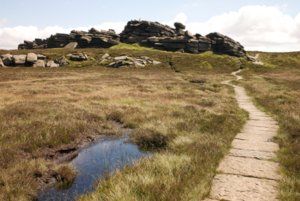
Gritstone landscape, Back Tor, Derwent Edge
Photo: Duncan Hawley
British Geological Survey (BGS)
BGS provides extensive resources for educational purposes
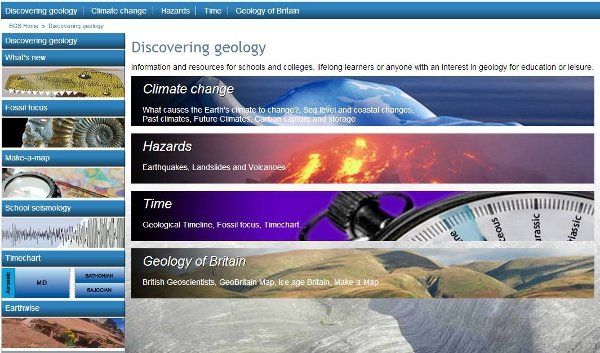
Earthlearningidea
Earthlearningidea is a website, set up and run on a purely voluntary basis by three retired geology teachers to provide activities relevant to the teaching of Earth Science, with occasional forays into the solar system! It began during the UN's Year of Planet Earth
in 2008 and continues to post one new activity per fortnight on the web. There are currently over 250 activities available, many of which have been translated by overseas volunteers into eleven other languages.
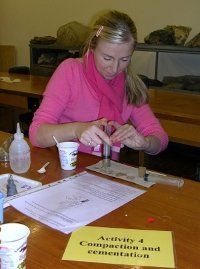
ELI Teacher education in UK - making a rock
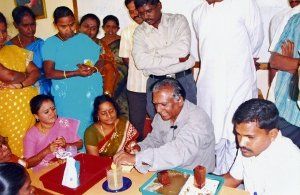
ELI Teachers trying out Earthlearningideas in India
Geoconservation UK Education Project
https://geohubliverpool.org.uk/esos/index.htm
The Geoconservation UK Education Project (Earth Science On-Site) ran from August 2004 to March 2008 and used former aggregates sites to develop and publish examples of high quality Earth Science field teaching activities for schools. The materials were devised to address the requirements of the National Curriculum at Key Stage 2 (7-11 yrs), KS 3 (11-14 yrs) and KS 4 (14-16 yrs - GCSE)
These materials are free and available through the ukrigs.org.uk website for teachers to adapt them to sites more local to schools. SAGT will also provide additional help on developing geoscience activities for teachers in the Sheffield Area.
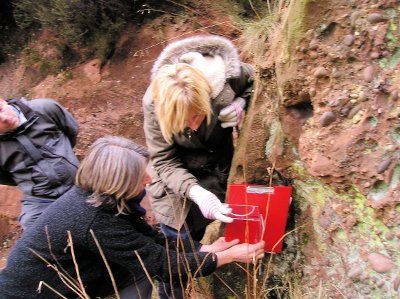
Teachers and NQTs on an ESOS field training course Park Hall Staffordshire.
Photo: John Reynolds
The Wider Field
British Science Week
British Science Week is held each March, and geological activities often feature in the local area, notably geological walkabouts for the general public in the built environment, and geological investigations for schools in their nearest graveyard.
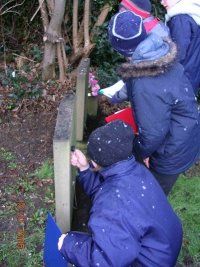
National Science Week -churchyard survey
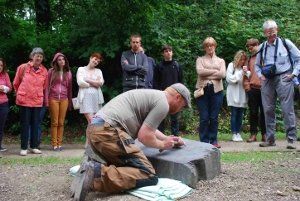
Public education - stonecarving on Stone Spiral, Sheffield General Cemetery
Rockwatch
A national club for children and their parents, which arranges indoor events and field trips from time to time.
The photograph shows a Rockwatch group investigating mineral processing at the historic Ecton Copper Mine in the Peak District.
www.ectonhillfsa.org.uk
for details.
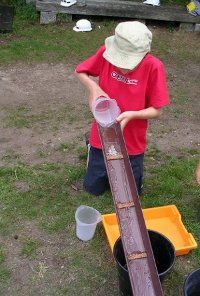
Rockwatch at Ecton - buddling for galena
Yorkshire Geological Society
The YGS holds regular indoor meetings in the winter months, which vary in their location, and field visits during the summer months. The Society also promotes Yorkshire Geology Month, held in May each year.
University of the Third Age (U3A)
The U3A is a self-help organisation for older people and has many local special interest groups.
For Sheffield see:
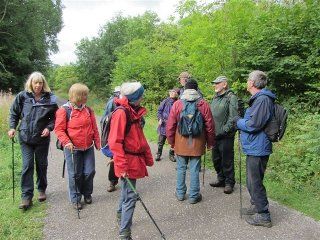
U3A group
Photo: H. White
Down to Earth (DTE)
DTE is a quarterly 'geological newspaper', which provides updating articles and publicises meetings and field trips, both local and residential.
For details contact the Editor
email: sageologytrust@gmail.com
Copyright: Sheffield Area Geology Trust. Registered Charity No. 1133465, England
